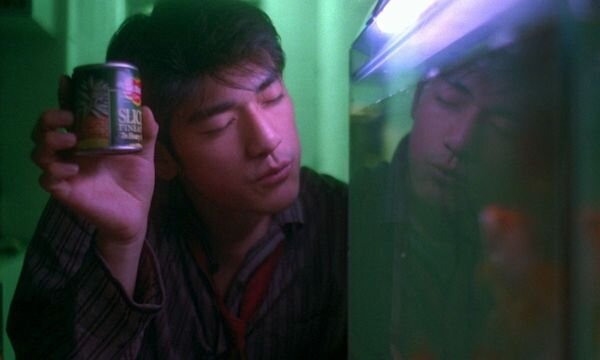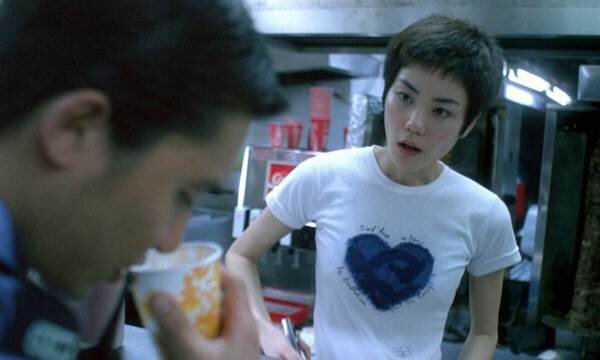A hazy, kinetic exploration of love and loss, Wong Kar-wai’s two-part romance Chungking Express takes hold of the audience with hypnotic power. Keli Williams, writes through her youthful experience of first falling in love with it.
Released in 1994 to critical acclaim, Chungking Express consists of two stories told in sequence, each about a love-struck Hong Kong police officer contemplating his relationship with a woman. The first half deals with Cop 223, a distressed and melancholic man, heartbroken about his girlfriend leaving him after five years. Purchasing tins of pineapple with an expiration date of May 1 each day for a month, he rekindles the relationship by the end of that time but soon decides it has expired forever – all while meeting a woman in a blonde wig who tries to survive after a smuggling operation turns upside down in the drug underworld. The second half shows Cop 663 managing a breakup with his flight attendant girlfriend, talking to his apartment furnishings as a coping mechanism that helps him through his daily tumult, only to catch the eye of new girl Faye at a local lunch counter at the Midnight Express bar who secretly falls in love with him; as he does with her.
It’s hard to find a film that instantly wraps you up in the solitude that revolves around the dissecting relationships Wong Kar-wai creates, and the exploration the filmmaker immerses around the absent, realistic and silent portrayal of love. Embarking on the loneliness that romance can cause, not only does Chungking Express establish the character’s reflection of self-doubt, but the subtle moments in a relationship that leave one in awe; the devotion that was transmitted from the start when fondness was first encountered. The film also builds on the act of ending a relationship and the isolation one can feel when getting over this loss. Such lingering is exemplified through one character’s fixation on cans of pineapples and their expiration dates, appointing them to recount their past affection. Focusing primarily on the acts of love and the underlying intentions of starting over, Chungking Express offers a stylish representation of passion and the overbearing question that lingers when the infatuation has gone: what becomes of the broken-hearted?
Set in 1994 Hong Kong, the film bears an atmosphere so electric and dense that its melodramatic storyline doesn’t seem fitting at first. Teeming with a collective urge of hidden emotion and neon blurred edges, people pushing and elbowing through crowds, the characters that show such intent and heat through the swarm of the city present themselves differently when their personal lives come into the picture. Wong illustrates the characters with loneliness, separate from each other until a scarce connection occurs. In an opening voiceover, Cop 223 addresses the absurdity, and clashes it with a potent observation on life itself: “Every day we brush past so many other people. People we may never meet or people who may become close friends”. There is no immediate interaction other than the occasional eye contact, but that’s what makes it so special. Seeing another’s face is simply telling a concealed story, and this is the main focus of Chungking Express. How many of those stories we see throughout the course of the day, whether it be in a restaurant, shop or street, are similar, and how many are truly unique?
The film contains very little traditional action and relies on kinetic camerawork, but the character-based motion picture is fuelled by thematic explorations, rather than a fast-moving plot. Wong directs a fresh encounter of the human experience and details the aspects of life that break the often-repeated patterns, the failure and the reward being alive can present.
Wong tells two disparate tales that draw connection at the Midnight Express snack bar in Hong Kong. The stories don’t intertwine, yet the parallel course of love and loss is what connects them. The first half focuses on a young policeman, He Qiwu, who is desperately seeking contact with his ex-girlfriend. After being together for five years, it’s revealed that she walked out on him, causing Qiwu to bare a sense of emptiness. Combining sadness with stacked cans of expired pineapple in his kitchen, the fruit he shoves into his mouth makes it ultimately clear that his way of dealing with grief compiles to more heartache as time goes on. Although it’s the idea of being in love that Qiwu seems to lean more instinctively towards, rather than the faith and commitment that comes along with it, it’s also clear that Qiwu doesn’t have a grip on what love truly is, merely infatuated with the idea of having it nonetheless. Cop 223’s narrative is the film’s most affecting and truthful representation of finding peace after a break-up. Whether I compile cans of pineapple like Qiwu, or live life carelessly, I’ll have that pocket of reassurance and comfort from being fine by myself. The stories we tell ourselves about our place in the world, and those we tell ourselves about others, can ultimately result in leading a new and better life later on.
Following another man, Cop 663, who has been dumped by his girlfriend, there’s a summertime innocence as The Mama & Papa’s “California Dreamin” plays and the beginning romance of two opposites attract. Behind the Midnight Express snack bar stands Faye, who gradually starts to notice Cop 663 when he starts hanging around the area during his shifts. At first, he’s there to order meals for his girlfriend (the stewardess), who, after leaving him, means he returns for black coffee throughout the week and imagines that everything in his apartment misses her as much as he does. As the narrative progresses, however, the real loss is that of the observant and giddy girl who he returns to for distraction every day; the girl who feels affection towards the man who’s become attached to her snack stand and the loud music she plays behind it. After obtaining a key to his apartment from a letter left by his ex-girlfriend at her work stand, Faye begins sneaking in, cleaning and redecorating while he’s at work. It’s a game of cat and mouse, as it’s almost guaranteed that the cop will come home and unexpectedly find the young woman lounging on his bed, plucking and observing his fallen hairs. And he does, at one point, as well as finding her overplayed album “If You Can Believe Your Eyes and Ears” by The Mama and the Papas, that he claims is his ex-girlfriend’s to save her embarrassment, instead inhabiting an essence of love through forgiveness and compassion, instead of showing anger when that someone he doesn’t know has been rummaging through his apartment. However this could be due to the stewardess’ absence, and his belief to change his tone as not to make another woman in his life leave him, or it could be that he senses the goodness and adoration from what she’s been doing for him. Either way, Wong builds the narrative with blasts of charm and crisscrossing of desire, and it’s beautiful.
Wong Kar-wai encompasses the energetic drive of succeeding that I carry with me today. Those small characters that spiralled into disbelief one morning, and stood mouthing the words of their favourite song behind the snack bar that night, guided me to recognise the parts of life I was frequently missing. The moment that would soon lead me to pick up another boarding pass and ask where he would want to go. And it could be anywhere.
Keli Williams (@beforesnrise) is a freelance writer based in Liverpool. She loves all things cinema and Jake Gyllenhaal, and currently works as a features writer for The Simple Cinephile, where she covers both television and film.
READ ME is a platform for female-led writing on film commissioned by Girls on Tops. Louisa Maycock (@louisamaycock) is Commissioning Editor and Ella Kemp (@ella_kemp) is Contributing Editor.




